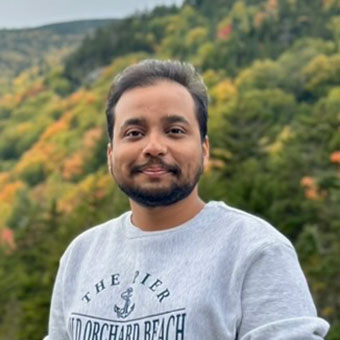Anurag Roy
 Anurag Roy
Anurag Roy
- PhD student, 3rd year
- Graduate program: Chemistry
- Accomplishments: URCC Peer Research Mentor 2023-24
Spotlight Interview
The responses have been edited for clarity and length.
URCC: Anurag, please tell us a bit about yourself.
AR: I am a 3rd year PhD candidate in the Department of Chemistry at Brandeis University. I have completed my bachelor’s and master’s degree in chemistry from India after which I was employed at a UK-India based pharma-biotech industry for 2 years as a Research chemist before I came to the US for my PhD in 2021. I am a travel enthusiast and like to try different cuisines at new places.
URCC: What is your research project? What research questions are you investigating?
AR: My research focuses on development of glycopeptide conjugates as potential HIV-Vaccine candidates. I am trying to synthesize carbohydrate-based vaccines for HIV working in the interface of organic chemistry and chemical biology.
URCC: What have you discovered thus far, either about your research topic or the process of doing research?
AR: HIV being an unsolved mystery still, has attracted many researchers across the globe and different groups (academia/industry) have different approaches to target it. My research involves targeting it via directed evolution-based carbohydrate-peptide conjugates and I have proposed a plausible synthetic route to make these serum stable glycopeptide conjugates and am currently working on its synthesis.
URCC: From whom do you/did you receive research mentoring, guidance, inspiration?
AR: I received my preliminary research guidance and training from my Bachelors’ Honors thesis Supervisor and my Masters’ dissertation thesis supervisor. My former colleagues and my mentor helped develop my practical skills, troubleshooting ability and critical thinking capability while I was working in the industry. At Brandeis my PhD supervisor Professor Isaac Krauss provides immense guidance and mentoring so that I learn new techniques, instrument handling and managerial skills efficiently.
URCC: How do you mentor new and aspiring researchers?
AR: [Anurag is a URCC Graduate Peer Research Mentor] I engage in conversations about what they are doing, how they are thinking to address a particular problem backing with logical reasoning so that they develop a profound understanding of the domain and also an innate liking towards it, which I think will help them to develop real-time troubleshooting skills and critical thinking ability.
URCC: What type of funding have you received for your project, including grants, fellowships, and paid research assistant positions?
AR: My project is funded through Professor Krauss’ research grant from the NIH. I am a research assistant currently paid by the GSAS of Brandeis University. Also, I have served as paid teaching assistant for 2 years (2021-2023) for which I was awarded the Graduate Teaching Assistantship Award by the GSAS for 2 consecutive years (2021-2022 and 2022-2023).
URCC: What advice do you have for students who want to participate in research?
AR: My advice for students who want to participate in research will be to first develop an innate liking towards the domain of your research and to have the mindset to bear the ownership and responsibility of your research. If you find joy in your work, then that definitely would be productive and if you can take ownership of the achievements and the failures of your work, then you are whole hearted and diligent in your actions and that’s what is needed for the perseverance to win this marathon.
URCC: What sparked your interest in your chosen academic research area? Did you engage in any creative or research projects prior to your current project? If so, can you tell us about them?
AR: My previous research during my master’s degree focused on medicinal chemistry which led me to explore this domain of chemistry involving human health. My previous role as Research Chemist in the industry involved synthesizing small molecules for various oncological targets which convinced me to pursue research in the areas of unsolved problems regarding human health, such as cancer, HIV etc., which has a vast importance.